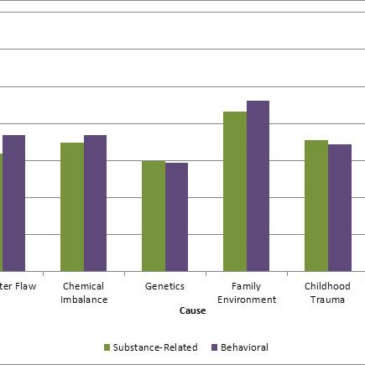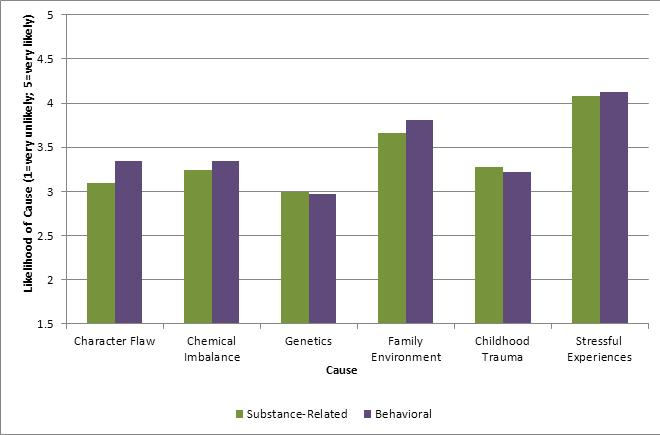Mental health disorders, particularly substance-related disorders, are often accompanied by stigma (Crisp, Gelder, Goddard, & Meltzer, 2005). This stigma likely serves as a barrier to treatment for many individuals (Keyes et al., 2010). People who wouldn’t think twice about seeking treatment for body ailment might struggle alone with the debilitating consequences of addiction. However, researchers and providers have worked to reduce the stigma surrounding mental illness, including addiction. Alcohol and drug use disorders are now viewed by many as disorders with genetic and neurochemical components (Pescosolido et al., 2010). This week, as part of our Special Series on Gambling Disorders, we review an article that investigated whether the shift in views of addiction extends to behavioral addictions such as gambling (Konkoly Thege et al., 2015).
Methods
- Researchers administered a survey to 4,000 individuals living in Alberta, randomly selected from members of a large Canadian Internet panel. The sample of 4,000 represents 21% of those invited to participate.
- The survey included questions about four substances (alcohol, marijuana, tobacco, cocaine) and six behaviors( gambling, shopping, eating, sex, video gaming, work) with addictive potential.
- Respondents indicated on a 5-point scale for one randomly selected substance/behavior:
- How addictive they thought the substance/behavior was;
- How likely they thought problems with that particular substance/behavior were caused by each of six factors (i.e., character flaw, chemical imbalance, genetics, family environment, early childhood trauma, or recent stressful experiences).
- The authors examined perceptions of individual substances/behaviors and also took averages across all substances and across all behaviors. In this review, to make comparisons, we focus in particular on perceptions of alcohol and gambling.
Results
- Overall, respondents rated substances as significantly more addictive (M=4.0, SD=1.1) than behaviors (M=3.3, SD=1.1). In particular, tobacco and cocaine were rated more highly than any of the eight other substances/behaviors.
- Alcohol and gambling were rated as similarly addictive, approximately 3.4 and 3.5, respectively, on the 1-5 scale.
- As Figure 1 shows, respondents thought that current stressful experiences and family environment growing up were the most likely causes of both behavioral and substance-related addiction. Genetics were rated as the least likely cause.
- Alcohol and gambling problems were both rated as most likely to be caused by current stressful experiences. Genetics was also seen as a likely cause of alcohol problems, and character flaws were seen as a likely cause of gambling problems.
- However, respondents thought that behavioral addictions were significantly more likely to be caused by character flaws, chemical imbalances, and family environment than were substance-related addictions (Figure 1).
- Participants thought that genetics and childhood trauma were more likely to cause alcohol problems than gambling problems.
- In a model that included all variables, the variables that best distinguished behavioral from substance-related addictions were respondents’ beliefs about addictive potential and ratings of the likelihood of problems being caused by a character flaw.
Figure 1. Perceived causes of substance-related vs. behavioral forms of addiction (adapted from Konkoly Thege et al., 2015).
Limitations
- The sample is representative of an Internet panel, but might not be representative of the general population.
- Respondents’ ratings reflect, in part, the specific substances and behaviors chosen for the survey. Different substances and behaviors might have solicited different responses
Conclusion
Though the reviewed study shows that behavioral and substance-related addictions are perceived fairly similarly overall, there are a few differences that suggest that behavioral addictions might elicit more stigma than substance-related addictions. In particular, people appear to view substances as inherently more “addictive” than behaviors and consider behavioral addictions more likely to result from character flaws than substance-related addictions. This added stigma likely serves as an additional barrier to treatment for those suffering from behavioral addictions.
-Sarah E. Nelson
What do you think? Please use the comment link below to provide feedback on this article.
References
Crisp, A., Gelder, M., Goddard, E., & Meltzer, H. (2005). Stigmatization of people with mental illnesses: A follow-up study within the Changing Minds campaign of the Royal College of Psychiatrists. World Psychiatry, 4(2), 106-113.
Keyes, K. M., Hatzenbuehler, M. L., McLaughling, K. A., Link, B., Olfson, M., Grant, B. F., et al. (2010). Stigma and treatment for alcohol disorders in the United States. American Journal of Epidemiology, 172(12), 1364–1372.
Konkoly Thege, B., Colman, I., el-Guebaly, N., Hodgins, D. C., Patten, S. B., Schopflocher, D., . . . Wild, T. C. (2015). Social judgments of behavioral versus substance-related addictions: A population-based study. Addictive Behaviors, 42, 24-31.
Pescosolido, B. A., Martin, J. K., Long, J. S., Medina, T. R., Phelan, J. C., & Link, B. G. (2010). "A disease like any other"? A decade of change in public reactions to schizophrenia, depression, and alcohol dependence. American Journal of Psychiatry, 167(11).






Basim Elhabashy March 19, 2015
This article gives clear idea for report of substance abuse. Sometimes overdose of any drug heavily affects on mind and cause problems of mental health disorder.